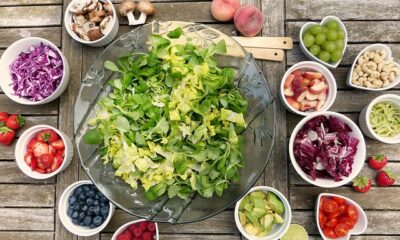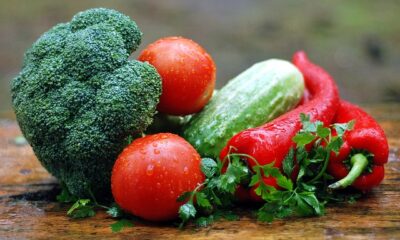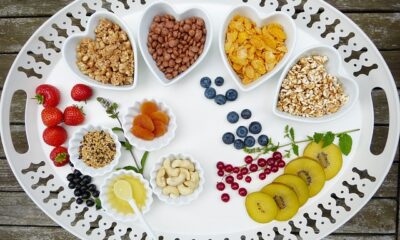Uncategorized
Revitalize Your Life: The Healing Power of Top 10 Nutrient-Rich Foods

In today’s fast-paced world, where convenience often trumps nutrition, it’s easy to overlook the importance of what we put into our bodies. However, the foods we consume play a crucial role in our overall health and well-being. From boosting immunity to preventing chronic diseases, a balanced diet can work wonders. Here are the top 10 foods that should find a permanent place in your kitchen:
Leafy Greens
Leafy greens like spinach, kale, and Swiss chard are packed with vitamins, minerals, and antioxidants. They are low in calories but high in fiber, making them excellent for weight management and digestive health. Incorporating leafy greens into your meals can help reduce the risk of heart disease, improve bone health, and promote radiant skin.
Berries
Berries such as blueberries, strawberries, and raspberries are nutritional powerhouses. They are rich in antioxidants, particularly flavonoids, which have anti-inflammatory and anti-cancer properties. Berries are also a great source of vitamins, fiber, and phytonutrients, making them effective in combating oxidative stress and supporting brain health.
Fatty Fish
Fatty fish like salmon, mackerel, and sardines are loaded with omega-3 fatty acids, essential for heart health and brain function. These healthy fats can help lower blood pressure, reduce triglycerides, and decrease the risk of stroke and heart disease. Incorporating fatty fish into your diet at least twice a week can provide significant health benefits.
Nuts and Seeds
Nuts and seeds such as almonds, walnuts, chia seeds, and flaxseeds are nutrient-dense snacks that offer a wide range of health benefits. They are rich in healthy fats, protein, fiber, vitamins, and minerals. Consuming nuts and seeds regularly can help improve cholesterol levels, regulate blood sugar, and reduce the risk of chronic diseases like diabetes and obesity.
Whole Grains
Whole grains like quinoa, brown rice, oats, and barley are excellent sources of complex carbohydrates, fiber, vitamins, and minerals. They provide sustained energy, promote satiety, and support digestive health. Incorporating whole grains into your diet can help lower the risk of type 2 diabetes, heart disease, and certain cancers.
Avocado
Avocado is a unique fruit that is high in healthy monounsaturated fats, fiber, vitamins, and minerals. It is also a good source of potassium, which helps regulate blood pressure and reduce the risk of stroke. Adding avocado to your meals can improve cholesterol levels, promote weight loss, and enhance nutrient absorption.
Yogurt
Yogurt is a probiotic-rich food that is beneficial for gut health. It contains live cultures that help maintain a healthy balance of bacteria in the digestive tract. Consuming yogurt regularly can boost immunity, improve digestion, and reduce the risk of gastrointestinal issues like diarrhea and constipation. Opt for plain, unsweetened yogurt for maximum health benefits.
Legumes
Legumes such as beans, lentils, and chickpeas are affordable and versatile sources of plant-based protein, fiber, vitamins, and minerals. They are low in fat and cholesterol but high in nutrients, making them ideal for weight management and heart health. Incorporating legumes into your diet can help lower cholesterol levels, stabilize blood sugar, and promote satiety.
Olive Oil
Olive oil is a key component of the Mediterranean diet, known for its numerous health benefits. It is rich in monounsaturated fats and antioxidants, particularly oleic acid and polyphenols. Olive oil can help reduce inflammation, lower the risk of heart disease, and protect against oxidative damage. Use extra virgin olive oil for salad dressings and cooking to reap the most benefits.
Lean Protein Sources
Lean protein sources such as chicken, turkey, tofu, and eggs are essential for muscle growth, repair, and overall health. They are rich in high-quality protein, vitamins, and minerals, with minimal saturated fat and cholesterol. Incorporating lean protein into your meals can help maintain muscle mass, support weight loss, and keep you feeling full and satisfied.
Conclusion
Incorporating these top 10 foods into your diet can have a profound impact on your health and well-being. From boosting immunity to reducing the risk of chronic diseases, these nutrient-rich foods offer a wide range of benefits. So next time you’re grocery shopping or planning your meals, remember to prioritize these healthy options. Your body will thank you for it!
FAQs
1. Can I eat these foods every day?
Yes, these foods are not only delicious but also nutritious. Incorporating them into your daily diet can help you maintain optimal health.
2. Are there any side effects to eating these foods?
No, these foods are natural and wholesome, so they are unlikely to cause any adverse side effects when consumed in moderation.
3. Can I still eat other foods in addition to these top 10?
Of course! While these foods offer significant health benefits, it’s essential to maintain a balanced diet that includes a variety of foods from all food groups.
4. Are these foods suitable for people with dietary restrictions?
Yes, most of these foods are suitable for people with dietary restrictions, such as gluten-free or dairy-free diets. However, it’s always best to check labels and consult with a healthcare professional if you have specific concerns.
5. How can I incorporate these foods into my meals?
You can add leafy greens to salads, smoothies, or stir-fries; enjoy berries as a snack, in oatmeal, or yogurt parfaits; include fatty fish in grilled or baked dishes; sprinkle nuts and seeds on salads, yogurt, or oatmeal; substitute refined grains with whole grains in recipes; use avocado as a spread, topping, or in salads; enjoy yogurt as a snack, in smoothies, or as a topping; add legumes to soups, salads, or grain bowls; use olive oil for cooking, salad dressings, or dips; and incorporate lean protein sources into main dishes like salads, stir-fries, or sandwiches.
-
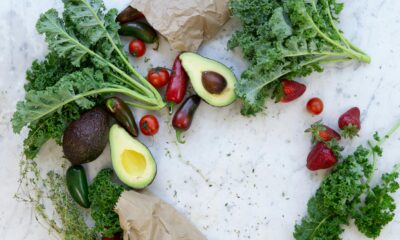
 Uncategorized2 months ago
Uncategorized2 months ago15 Deceptive Myths About Nutritious Eating We’ve Embraced for Generations
-
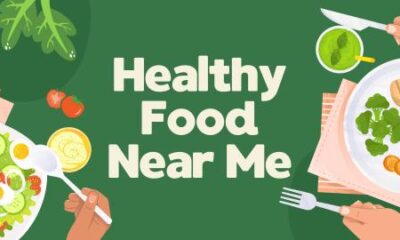
 Uncategorized2 months ago
Uncategorized2 months agoNavigating the Pursuit of Wellness: Unveiling the Domain of Healthy Food Near Me
-
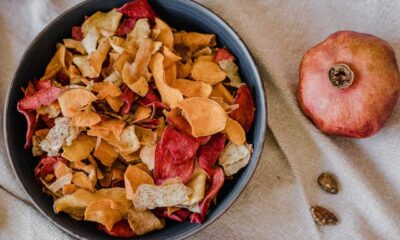
 Snacks and Appetizers6 months ago
Snacks and Appetizers6 months agoCrunchy crisps from the oven: the perfect snack without the shame
-

 Lunch and Dinner Recipes6 months ago
Lunch and Dinner Recipes6 months agoSeafood sensation: delicious and nutritious fish recipes for a healthy dinner
-
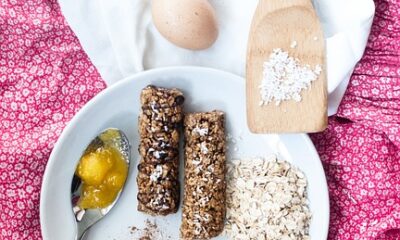
 Breakfast Recipes6 months ago
Breakfast Recipes6 months agoHomemade power bar: the excellent grab-and-go breakfast option for an active early morning
-
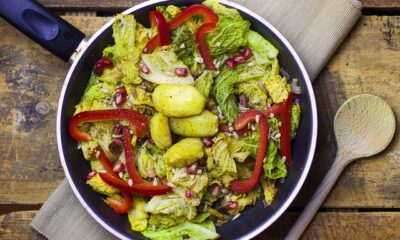
 Lunch and Dinner Recipes6 months ago
Lunch and Dinner Recipes6 months agoVegetarian Stir-Fry: A Burst Of Health And Flavor In Every Bite
-
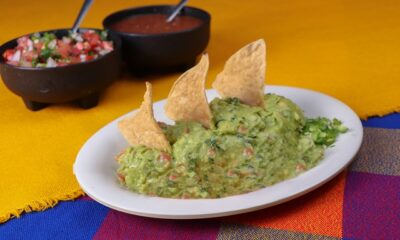
 Snacks and Appetizers6 months ago
Snacks and Appetizers6 months agoDeliciously hot Guacamole and salsa recipes to enhance the great experience
-

 Breakfast Recipes6 months ago
Breakfast Recipes6 months agoProtein-Packed Pancakes: A Delicious Method To Start Your Day






